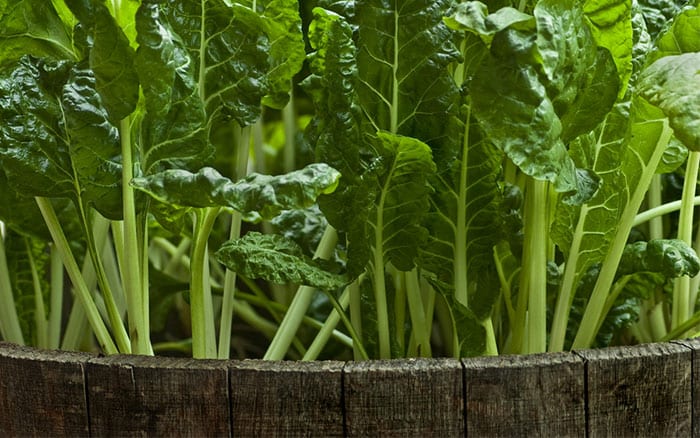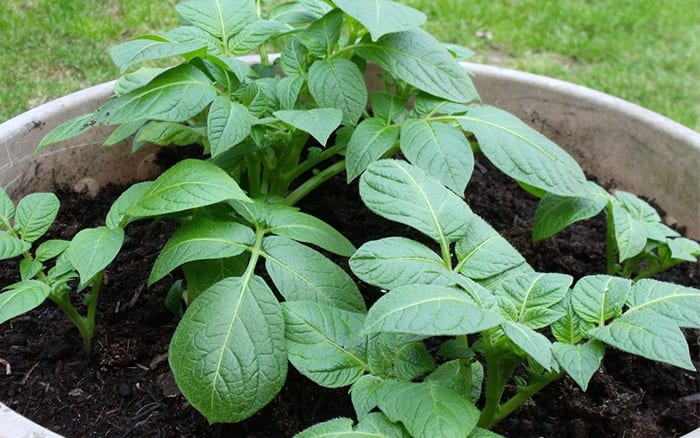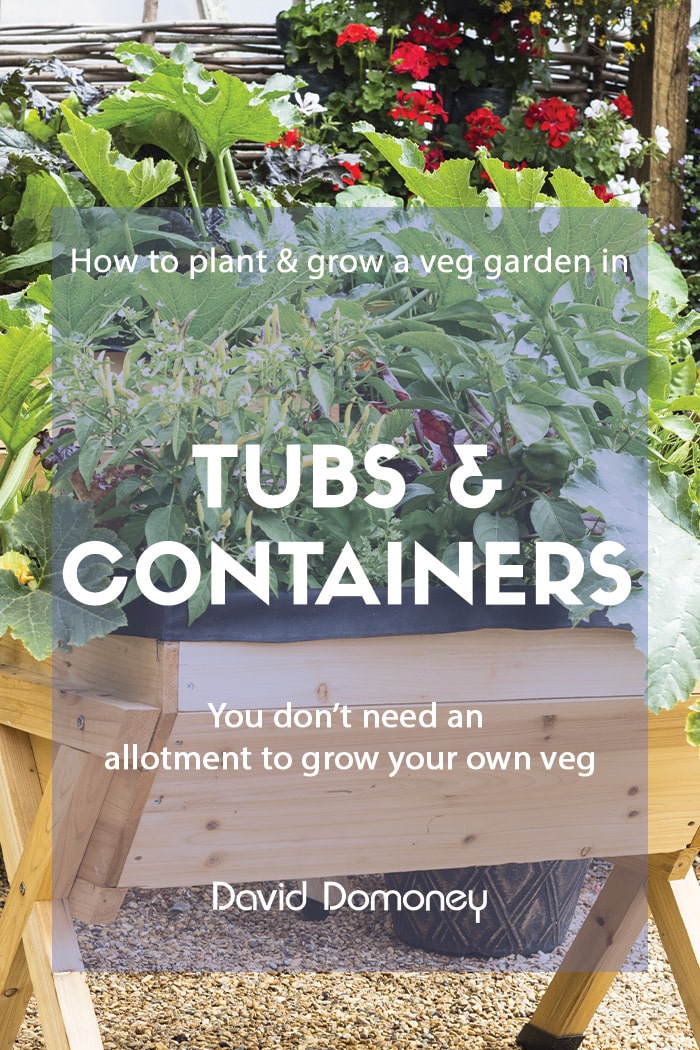[fusion_builder_container hundred_percent=”yes” overflow=”visible” type=”legacy”][fusion_builder_row][fusion_builder_column type=”2_3″ type=”2_3″ layout=”1_1″ background_position=”left top” border_style=”solid” spacing=”yes” background_repeat=”no-repeat” margin_top=”0px” margin_bottom=”0px” animation_speed=”0.3″ animation_direction=”left” hide_on_mobile=”no” center_content=”no” min_height=”none” last=”false” hover_type=”none” border_position=”all” align_self=”flex-start” first=”true” link=””][fusion_text rule_style=”default” hide_on_mobile=”small-visibility,medium-visibility,large-visibility” sticky_display=”normal,sticky” animation_direction=”left” animation_speed=”0.3″]

You don’t need an allotment to grow your own veg. You don’t need a large garden, or a designated veg patch.
All you need to enjoy the taste of fresh veg at home is a few tubs.
There are loads of crops that thrive in containers. You can grow them on patios, balconies, windowsills, driveways and in conservatories.
Tomatoes are the first one that springs to mind. They are nearly always grown in growbags, and smaller varieties work well in hanging baskets. But why stop there? Get growing carrots, beetroot, potatoes, salad leaves and dwarf French beans in containers!
Getting started
[/fusion_text][fusion_text]

The type and size of container depends on the crop you wish to grow. Underground veg like carrots and potatoes need deep soil, so choose a tall container. Salads, beans, peas and beetroot need less depth, so you can use something wider and shallower.
Pick the right spot for the container before you fill it with peat-free compost and plants as it may be too heavy to move. Choose a sunny, sheltered position – ripening vegetables don’t like to be in the shade.
Make sure you have plenty of drainage material like rocks, gravel and broken pottery at the bottom of the container before adding any soil or peat-free compost. This will ensure good drainage and prevent the soil from becoming waterlogged, which will rot the roots.
Once you’ve planted up your container with young vegetable plants, spread a layer of mulch on the surface of the soil to help retain moisture and keep weeds at bay.
Care and maintenance
[/fusion_text][fusion_text rule_style=”default” hide_on_mobile=”small-visibility,medium-visibility,large-visibility” sticky_display=”normal,sticky” animation_direction=”left” animation_speed=”0.3″]

Container-grown vegetables will need a little more attention than those in the garden. Make sure you feed and water the plants regularly. Stake the plants where necessary to give support and keep a vigilant lookout for pests and disease.
You’ll need to water daily, especially in warmer weather to ensure the soil doesn’t dry out. Vegetable plants need to have a frequent supply of water and nutrients to produce that tasty veg!
Pest control
There are always unwelcome visitors on the lookout for your young vegetable plants so pest protection is paramount.Try using natural measures to control the slugs like sticking a ring of self-adhesive copper tape around the containers. Slugs won’t cross this material because it gives them a small electric shock. Or setting beer traps.
[/fusion_text][fusion_text rule_style=”default” hide_on_mobile=”small-visibility,medium-visibility,large-visibility” animation_direction=”left” animation_speed=”0.3″]

Or sprinkle a ring of sharp grit or crushed eggshells around the base of the plants or around the containers themselves to deter slugs and snails.
Check regularly for caterpillars which may appear on the underside of the leaves and remove them by hand (wear gloves if you don’t want to touch them!)
You can even deter bugs with some clever planting! Put a few marigolds among your tomato plants to deter whitefly.
Or try planting several different vegetables in the same container as this seems to confuse pests. For instance, plant spring onions alongside lettuce and carrots.
Get growing your own!
More and more of us are growing our own veg for lots of different reasons. The cost of food keeps rising, and people are becoming more concerned with food miles and the use of commercial pesticides.
But most importantly, we all want the vegetables we eat to be as fresh and tasty as possible. And nothing tastes as good as veg you’ve grown you’re your own hands. With a little effort, you will literally reap the rewards!
Bon appetit!
[/fusion_text][/fusion_builder_column][fusion_builder_column type=”1_6″ type=”1_6″ align_self=”auto” content_layout=”column” align_content=”flex-start” content_wrap=”wrap” center_content=”no” target=”_self” hide_on_mobile=”small-visibility,medium-visibility,large-visibility” sticky_display=”normal,sticky” order_medium=”0″ order_small=”0″ hover_type=”none” border_style=”solid” box_shadow=”no” box_shadow_blur=”0″ box_shadow_spread=”0″ background_type=”single” gradient_start_position=”0″ gradient_end_position=”100″ gradient_type=”linear” radial_direction=”center center” linear_angle=”180″ background_position=”left top” background_repeat=”no-repeat” background_blend_mode=”none” animation_direction=”left” animation_speed=”0.3″ filter_type=”regular” filter_hue=”0″ filter_saturation=”100″ filter_brightness=”100″ filter_contrast=”100″ filter_invert=”0″ filter_sepia=”0″ filter_opacity=”100″ filter_blur=”0″ filter_hue_hover=”0″ filter_saturation_hover=”100″ filter_brightness_hover=”100″ filter_contrast_hover=”100″ filter_invert_hover=”0″ filter_sepia_hover=”0″ filter_opacity_hover=”100″ filter_blur_hover=”0″ last=”false” border_position=”all” first=”false” min_height=”” link=””][/fusion_builder_column][fusion_builder_column type=”1_6″ type=”1_6″ align_self=”auto” content_layout=”column” align_content=”flex-start” content_wrap=”wrap” center_content=”no” target=”_self” hide_on_mobile=”small-visibility,medium-visibility,large-visibility” sticky_display=”normal,sticky” order_medium=”0″ order_small=”0″ hover_type=”none” border_style=”solid” box_shadow=”no” box_shadow_blur=”0″ box_shadow_spread=”0″ background_type=”single” gradient_start_position=”0″ gradient_end_position=”100″ gradient_type=”linear” radial_direction=”center center” linear_angle=”180″ background_position=”left top” background_repeat=”no-repeat” background_blend_mode=”none” animation_direction=”left” animation_speed=”0.3″ filter_type=”regular” filter_hue=”0″ filter_saturation=”100″ filter_brightness=”100″ filter_contrast=”100″ filter_invert=”0″ filter_sepia=”0″ filter_opacity=”100″ filter_blur=”0″ filter_hue_hover=”0″ filter_saturation_hover=”100″ filter_brightness_hover=”100″ filter_contrast_hover=”100″ filter_invert_hover=”0″ filter_sepia_hover=”0″ filter_opacity_hover=”100″ filter_blur_hover=”0″ last=”true” border_position=”all” first=”false” min_height=”” link=””][/fusion_builder_column][/fusion_builder_row][/fusion_builder_container][fusion_builder_container hundred_percent=”no” equal_height_columns=”no” hide_on_mobile=”small-visibility,medium-visibility,large-visibility” background_position=”center center” background_repeat=”no-repeat” fade=”no” background_parallax=”none” enable_mobile=”no” parallax_speed=”0.3″ video_aspect_ratio=”16:9″ video_loop=”yes” video_mute=”yes” border_style=”solid” margin_top=”0″ margin_bottom=”0″ padding_top=”0″ padding_right=”80″ padding_bottom=”0″ padding_left=”80″ type=”legacy”][fusion_builder_row][fusion_builder_column type=”1_1″ type=”1_1″ layout=”1_1″ center_content=”no” hover_type=”none” hide_on_mobile=”small-visibility,medium-visibility,large-visibility” background_position=”left top” background_repeat=”no-repeat” border_style=”solid” border_position=”all” animation_direction=”left” animation_speed=”0.3″ last=”true” border_sizes_top=”0″ border_sizes_bottom=”0″ border_sizes_left=”0″ border_sizes_right=”0″ first=”true” min_height=”” link=””][fusion_separator style_type=”single solid” hide_on_mobile=”small-visibility,medium-visibility,large-visibility” sep_color=”#d3d1d1″ top_margin=”20px” bottom_margin=”20px” border_size=”2″ alignment=”center” /][/fusion_builder_column][fusion_builder_column type=”1_2″ type=”1_2″ layout=”1_2″ center_content=”no” hover_type=”none” hide_on_mobile=”small-visibility,medium-visibility,large-visibility” background_position=”left top” background_repeat=”no-repeat” border_style=”solid” border_position=”all” animation_direction=”left” animation_speed=”0.3″ last=”false” border_sizes_top=”0″ border_sizes_bottom=”0″ border_sizes_left=”0″ border_sizes_right=”0″ first=”true” min_height=”” link=””][fusion_text rule_style=”default” hide_on_mobile=”small-visibility,medium-visibility,large-visibility”]
For more garden planting ideas, check out my blog:
[/fusion_text][/fusion_builder_column][fusion_builder_column type=”1_2″ type=”1_2″ layout=”1_2″ center_content=”no” hover_type=”none” hide_on_mobile=”small-visibility,medium-visibility,large-visibility” background_position=”left top” background_repeat=”no-repeat” border_style=”solid” border_position=”all” animation_direction=”left” animation_speed=”0.3″ last=”true” border_sizes_top=”0″ border_sizes_bottom=”0″ border_sizes_left=”0″ border_sizes_right=”0″ first=”false” min_height=”” link=””][fusion_text]
Or check out my Pinterest board for more ideas:
[/fusion_text][/fusion_builder_column][fusion_builder_column type=”1_2″ type=”1_2″ layout=”1_2″ center_content=”no” hover_type=”none” hide_on_mobile=”small-visibility,medium-visibility,large-visibility” background_position=”left top” background_repeat=”no-repeat” border_style=”solid” border_position=”all” animation_direction=”left” animation_speed=”0.3″ last=”false” border_sizes_top=”0″ border_sizes_bottom=”0″ border_sizes_left=”0″ border_sizes_right=”0″ first=”true” min_height=”” link=””][fusion_builder_row_inner][fusion_builder_column_inner type=”1_6″ type=”1_6″ layout=”1_6″ center_content=”no” hover_type=”none” hide_on_mobile=”small-visibility,medium-visibility,large-visibility” background_position=”left top” background_repeat=”no-repeat” border_style=”solid” animation_direction=”left” animation_speed=”0.3″ last=”false” border_position=”all” element_content=”” border_sizes_top=”0″ border_sizes_bottom=”0″ border_sizes_left=”0″ border_sizes_right=”0″ first=”true” min_height=”” link=””][/fusion_builder_column_inner][fusion_builder_column_inner type=”2_3″ type=”2_3″ layout=”2_3″ center_content=”no” hover_type=”none” hide_on_mobile=”small-visibility,medium-visibility,large-visibility” background_position=”left top” background_repeat=”no-repeat” border_style=”solid” animation_direction=”left” animation_speed=”0.3″ last=”false” border_position=”all” border_sizes_top=”0″ border_sizes_bottom=”0″ border_sizes_left=”0″ border_sizes_right=”0″ first=”false” min_height=”” link=””][fusion_imageframe image_id=”47206|large” style_type=”none” hover_type=”none” align_medium=”none” align_small=”none” align=”none” lightbox=”no” linktarget=”_self” hide_on_mobile=”small-visibility,medium-visibility,large-visibility” sticky_display=”normal,sticky” animation_direction=”left” animation_speed=”0.3″ filter_hue=”0″ filter_saturation=”100″ filter_brightness=”100″ filter_contrast=”100″ filter_invert=”0″ filter_sepia=”0″ filter_opacity=”100″ filter_blur=”0″ filter_hue_hover=”0″ filter_saturation_hover=”100″ filter_brightness_hover=”100″ filter_contrast_hover=”100″ filter_invert_hover=”0″ filter_sepia_hover=”0″ filter_opacity_hover=”100″ filter_blur_hover=”0″]https://new.daviddomoney.com/wp-content/uploads/2015/01/Easy-vegetables-feature-500×750.jpg[/fusion_imageframe][fusion_separator style_type=”none” hide_on_mobile=”small-visibility,medium-visibility,large-visibility” top_margin=”30px” alignment=”center” /][fusion_button link=”https://new.daviddomoney.com/10-best-easy-grow-vegetables-beginners/” target=”_self” alignment=”center” hide_on_mobile=”small-visibility,medium-visibility,large-visibility” sticky_display=”normal,sticky” color=”custom” button_gradient_top_color=”rgba(1,149,51,0)” button_gradient_bottom_color=”rgba(1,149,51,0)” button_gradient_top_color_hover=”#0e540f” button_gradient_bottom_color_hover=”#0e540f” accent_color=”#0e540f” accent_hover_color=”#ffffff” border_color=”#0e540f” border_hover_color=”#ffffff” size=”large” stretch=”yes” icon_position=”left” icon_divider=”no” animation_direction=”left” animation_speed=”0.3″ border_top=”3px” border_right=”3px” border_bottom=”3px” border_left=”3px” border_radius_top_left=”0px” border_radius_top_right=”0px” border_radius_bottom_right=”0px” border_radius_bottom_left=”0px”]Easy Veg[/fusion_button][/fusion_builder_column_inner][fusion_builder_column_inner type=”1_6″ type=”1_6″ layout=”1_6″ center_content=”no” hover_type=”none” hide_on_mobile=”small-visibility,medium-visibility,large-visibility” background_position=”left top” background_repeat=”no-repeat” border_style=”solid” animation_direction=”left” animation_speed=”0.3″ last=”true” border_position=”all” element_content=”” border_sizes_top=”0″ border_sizes_bottom=”0″ border_sizes_left=”0″ border_sizes_right=”0″ first=”false” min_height=”” link=””][/fusion_builder_column_inner][/fusion_builder_row_inner][/fusion_builder_column][fusion_builder_column type=”1_2″ type=”1_2″ layout=”1_2″ center_content=”no” hover_type=”none” hide_on_mobile=”small-visibility,medium-visibility,large-visibility” background_position=”left top” background_repeat=”no-repeat” border_style=”solid” border_position=”all” animation_direction=”left” animation_speed=”0.3″ last=”true” border_sizes_top=”0″ border_sizes_bottom=”0″ border_sizes_left=”0″ border_sizes_right=”0″ first=”false” min_height=”” link=””][fusion_builder_row_inner][fusion_builder_column_inner type=”1_6″ type=”1_6″ layout=”1_6″ center_content=”no” hover_type=”none” hide_on_mobile=”small-visibility,medium-visibility,large-visibility” background_position=”left top” background_repeat=”no-repeat” border_style=”solid” animation_direction=”left” animation_speed=”0.3″ last=”false” border_position=”all” element_content=”” border_sizes_top=”0″ border_sizes_bottom=”0″ border_sizes_left=”0″ border_sizes_right=”0″ first=”true” min_height=”” link=””][/fusion_builder_column_inner][fusion_builder_column_inner type=”2_3″ type=”2_3″ layout=”2_3″ center_content=”no” hover_type=”none” hide_on_mobile=”small-visibility,medium-visibility,large-visibility” background_position=”left top” background_repeat=”no-repeat” border_style=”solid” animation_direction=”left” animation_speed=”0.3″ last=”false” border_position=”all” border_sizes_top=”0″ border_sizes_bottom=”0″ border_sizes_left=”0″ border_sizes_right=”0″ first=”false” min_height=”” link=””][fusion_imageframe image_id=”43068|large” style_type=”none” hover_type=”none” align=”none” lightbox=”no” alt=”Pinterest” linktarget=”_self” hide_on_mobile=”small-visibility,medium-visibility,large-visibility” animation_direction=”left” animation_speed=”0.3″]https://new.daviddomoney.com/wp-content/uploads/2019/07/flower-power-pinterest-500×750.jpg[/fusion_imageframe][fusion_separator style_type=”none” hide_on_mobile=”small-visibility,medium-visibility,large-visibility” top_margin=”30px” alignment=”center” /][fusion_button link=”https://www.pinterest.co.uk/daviddomoney/” target=”_self” alignment=”center” hide_on_mobile=”small-visibility,medium-visibility,large-visibility” color=”custom” button_gradient_top_color=”rgba(1,149,51,0)” button_gradient_bottom_color=”rgba(1,149,51,0)” button_gradient_top_color_hover=”#e22626″ button_gradient_bottom_color_hover=”#e22626″ accent_color=”#e22626″ accent_hover_color=”#ffffff” size=”large” stretch=”yes” icon_position=”left” icon_divider=”no” animation_direction=”left” animation_speed=”0.3″ border_color=”#e22626″ border_hover_color=”#ffffff” border_top=”3px” border_right=”3px” border_bottom=”3px” border_left=”3px” border_radius_top_left=”0px” border_radius_top_right=”0px” border_radius_bottom_right=”0px” border_radius_bottom_left=”0px”]Pinterest Board[/fusion_button][/fusion_builder_column_inner][fusion_builder_column_inner type=”1_6″ type=”1_6″ layout=”1_6″ center_content=”no” hover_type=”none” hide_on_mobile=”small-visibility,medium-visibility,large-visibility” background_position=”left top” background_repeat=”no-repeat” border_style=”solid” animation_direction=”left” animation_speed=”0.3″ last=”true” border_position=”all” element_content=”” border_sizes_top=”0″ border_sizes_bottom=”0″ border_sizes_left=”0″ border_sizes_right=”0″ first=”false” min_height=”” link=””][/fusion_builder_column_inner][/fusion_builder_row_inner][/fusion_builder_column][/fusion_builder_row][/fusion_builder_container]

Leave a Reply